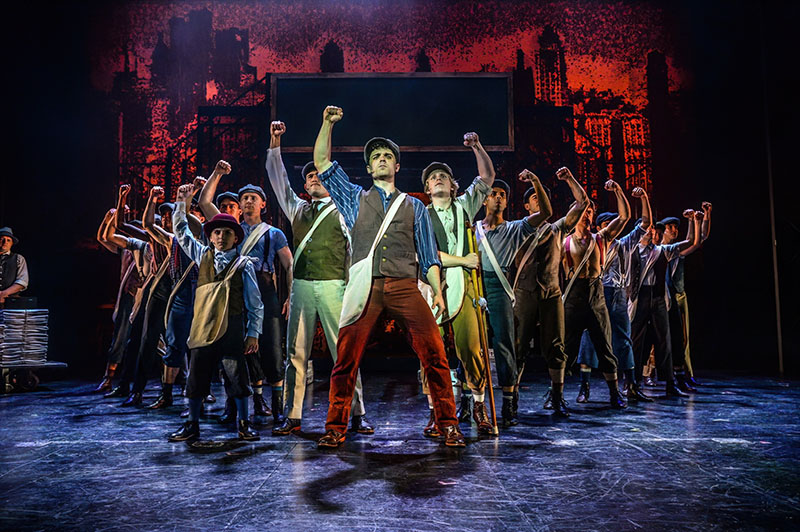
The deepest purpose of art is “not to convey, but to evoke,” the great novelist Jerzy Kosinski once observed. Clifford Michael Spulock demonstrated the power of this principle when lighting the Slow Burn Theatre Company’s production of Newsies earlier this summer at the Broward Center.
The story told in this Tony-winning musical, based on the 1992 Disney film of the same name, is very familiar to theatre goers. And Spulock does this narrative justice with precise lighting that conveys the tale of a group of ragamuffin newspaper kids who strike against the powerful publisher Joseph Pulitzer. However, he also goes well beyond “conveying,” by using a rich and delicately balanced blend of colors and dark space to evoke the mood of the world inhabited by these characters.
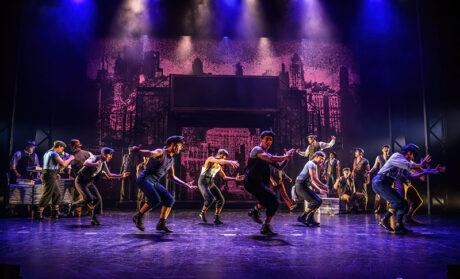
“It all plays back to the newspaper theme,” Spulock of CS Lighting, said of his design. “When you think of a newspaper at the end of the 19th century when this play takes place, you think black print on a white background, as well as sepia toned photos. So, my main goal was to use more sepia and white tones, as well as shadowy space to get the feeling of an older movie/newspaper. My more vibrant colors come out for the big dance numbers and to accent more intense moments of the show, but the overall tone fits the newspaper mood.”
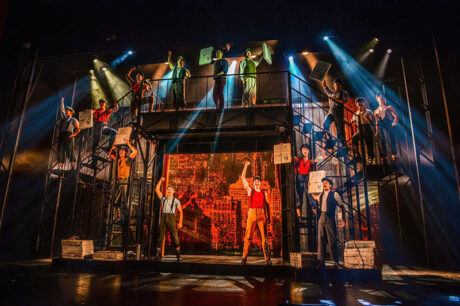
Helping Spulock achieve this evocative effect was a collection of 44 CHAUVET Professional Maverick, Rogue, and COLORado fixtures.
Playing a critical role in washing the stage with evocative colors were the 22 COLORado 2 Zoom Tour fixtures in Spulock’s rig. Arranged on four electrics over the stage, the RGBW units were used to project different combinations of redolent hues over a massive set piece.
Adding to the color-scape was the light from six Rogue R2X Wash fixtures. “Using my R2X washes as side lights, I was able to keep the actors lit while still keeping the shadows and gobo breakups present within my design,” said Spulock. “If I were to use a lot of standard color washes like in a normal theatre lighting plot, many of the dark spaces and shadows that were critical to my look would have disappeared.”
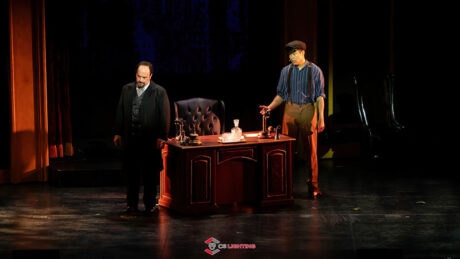
A pair of Maverick MK2 Profile fixtures and an equal number of Rogue R1X Spots were positioned on catwalks and were essential to helping Spulock break up the stage with interesting gobo patterns.
“Gobo breakups were a main part of my design for this production,” he said. “Being able to have a full stage of multiple different patterns with different colors really gave me many design options to choose from. I then used tight spots and moving washes to help direct the attention to where the action was happening.”
Creating breakups helped Spulock engender a sense of intimacy on a stage that had one large set piece rolling over it all the way to the extreme apron edge. “Dealing with the massive set piece was a fun challenge for me, more than anything,” said Spulock. “The amazing work of the director Patrick Fitzwater, the choreographer Trent Soyster, and the scenic designer Kelly Tighe really created wonderful staging.
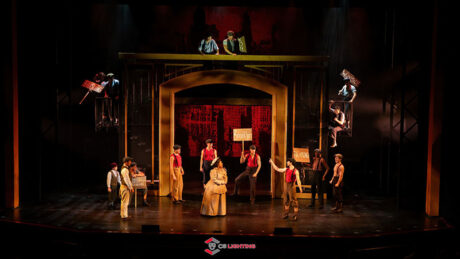
“Kelly deserves a great deal of credit for creating a set that was multifunctional while also taking lighting into consideration,” continued Spulock. “On one side, it was covered with a scrim that could be front lit to make it feel like we were in a theatre or Pulitzer’s office. Once I lit it from behind, the audience could see steps and scaffolding with newsboys dancing all over it!”
Through their dancing, these newsboys not only tell the story of a famous 1899 newspaper strike, but they also convey the excitement their real-life counterparts must have felt challenging a powerful publisher over 125 years ago– and in so doing they fulfilled the role of art.


